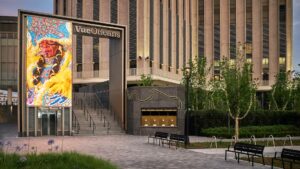
Travel the world through your palate in New Orleans
IQ
- 5 Min Read
In order to offer transparency into how our stories are produced and to teach our readers about the importance of media literacy online, the editorial team provides a quick self-rating of the integrity of the articles and the facts presented against the following IQ metrics.
- Published on May 11, 2023
- Last Updated November 2, 2023
- In Places
Travel the world through these Black and Israeli-owned James Beard Award-winning restaurants with Creole food, flavors of Senegal and the Middle East.
New Orleans is known for its rich culture and vibrant culinary scene. From Creole dishes to modern takes on global cuisines, you can travel the world through your palate. During a recent visit to The Big Easy, we tasted everything from traditional Creole dishes and soul food to the flavors of Senegal and the Middle East.
We had top dining experiences at the Black-owned restaurants of Café Sbisa, Lil’ Dizzy’s, Dakar NOLA, and the Israeli-owned Saba restaurant — all recipients of James Beard Awards.
Café Sbisa: a Black-owned fine-dining tradition
Established in 1899, Café Sbisa is a classic Creole restaurant and the third oldest fine-dining establishment in the French Quarter. Its elegant hand-carved mahogany bar from 1903 showcases a mural from the famous local artist George Dureau.

Chef-owner Alfred Singleton serves classics such as gumbo, jambalaya, and shrimp Creole, as well as fresh seafood and steaks. During our visit we enjoyed two favorites: Trout Eugene – topped with Louisiana shrimp, crawfish tails, and crab in a champagne cream sauce – and Blackened Redfish – served over grilled asparagus, Louisiana jumbo lump crabmeat, and citrus butter sauce. Café Sbisa holds a James Beard Award for Best Wine Program, and we sampled some of their award-winning selections.
Li’l Dizzy’s Cafe: Soul food in historic Treme
When people think of soul food and NOLA, the first restaurant that may come to mind is Dooky Chase and its legendary Creole chef Leah Chase. However, another mentionable if not iconic family-owned and operated Creole soul food restaurant isLi’l Dizzy’s.

Located in Treme, Li’l Dizzy’s lunch menu boasts classic southern dishes such as greens, fried chicken, and an incredible mac-n-cheese. It opened in 2005 by Wayne Baquet Sr, who learned the restaurant industry from his father, Eddie Baquet Sr. of 7th Ward Eddie’s Restaurant. Li’l Dizzy’s has since earned a James Beard America’s Classic Award, which recognizes regional establishments with timeless appeal.
The restaurant is now owned and operated by Wayne Jr. and his wife Arkesha. Since 1947, the Baquet family has owned and operated over 10 restaurants, and Li’l Dizzy’s Cafe is the only one that remains. After dining on green beans, grits, and smothered pork chops, we can attest to the finger-licking, lip-smacking, and tummy-rubbing good food that Li’l Dizzy’s serves up.
Dakar NOLA: Senegalese food with a modern twist
One of the most unique and immersive dining experiences we’ve ever had was at Dakar NOLA.

Located in Mid-City, Dakar NOLA is a Senegalese restaurant that offers a 7-course pescatarian tasting menu created by Serigne Mbaye, a James Beard Award finalist for emerging chef.
Its menu features seafood, produce, and spices from two coastal cities in Senegal and Louisiana. The menu pays homage to the Senegalese people and other West Africans who were brought to Louisiana during the slave trade and the food traditions that still echo in New Orleans today.

There is only one seating time for dinner at Dakar NOLA and only 30 place settings available in the dining room, beautifully decorated with African artwork and textiles. The multiple-course dining experience starts with traditional hand washing at the table. A fragrant liquid soap is placed in the hands of every diner while a teapot of warm water is poured over them above a brass bowl. Each diner then dries their hands with a hot hand towel.
Before serving, Chef Mbaye enters the dining room to describe each course and share its cultural and historical significance. The menu varies slightly from night to night but there are several constants like ataya, a mint and ginger-heavy Senegalese tea that excites the palate for the dishes to come.

Another staple course (and our favorite) is what’s known in Senegal as the “Last Meal”—a dish featuring black-eyed peas that enslaved Africans were fed before their forced sailings across the Atlantic. In Chef Mbaye’s variation, the black-eyed peas are served on crispy rice which adds a wonderful texture and it is topped with lump crab meat and palm oil, a Senegalese staple.

Other courses we enjoyed were a nice blend of West African and Louisiana ingredients, like Parce Que—gulf shrimp, cabbage and tamarind jus–and the Fonio Salad that included West African millet, compostela mixed greens, carrots, and smoked trout roe.

Every menu item at Dakar NOLA is inspired by Chef Serigne Mbaye’s most cherished childhood memories and the times spent cooking with his mother in Senegal.
Saba: A fresh take on Middle Eastern cuisine
Saba, which means “grandfather” in Hebrew, is a culinary love letter to the Middle East and New Orleans by James Beard award-winning chef Alon Shaya.
Like grandfathers who have many life experiences and stories to share, Saba shares stories about the intersections of food and culture with a menu that reflects the tastes of the Middle East, Europe, and North Africa, with a Louisiana flair. Located in Uptown New Orleans, Saba features traditional dishes like falafel, lamb kebab, and tabbouleh, along with many vegetarian and gluten-free options—all served with a modern twist.
One of the best dishes was a hummus topped with Louisiana blue crab served with wood fired pita. We also had grilled Louisiana shrimp with accompanying labneh, roasted peppers, turmeric and pistachio duqqa, as well as lamb kofta with whipped tahini, blistered peppers, and toasted pine nuts.
The diversity of food
Café Sbisa, Li’l Dizzy’s, Dakar NOLA, and Saba are among New Orleans’ most popular and celebrated restaurants. Whether you’re in the mood for classic Creole dishes, Southern breakfast favorites, West African cuisine, or modern Middle Eastern fare, these restaurants are sure to deliver a memorable international dining experience, without needing a passport.
CORRECTION: While Saba’s chef Alon Shaya is a James Beard award-winning chef, the restaurant is not. We apologize for the error.
Ian and Tonya Fitzpatrick are contributors to DETOUR and the founders of World Footprints, a social impact travel storytelling content hub.
This story was originally published May 11, 2023 1:50 PM.





